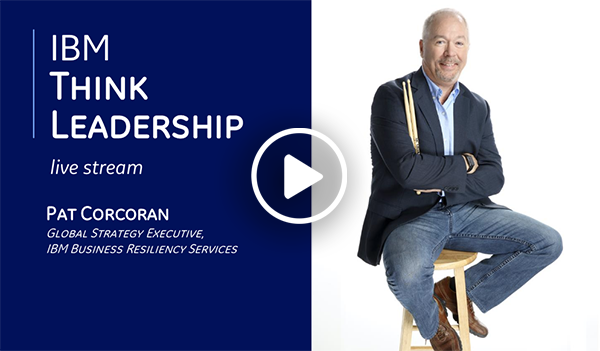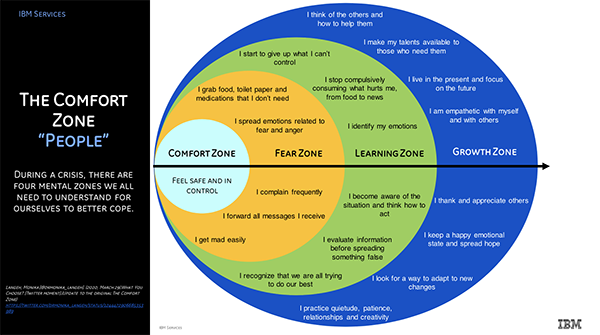IBM and Coronavirus stories
IBM’s Pat Corcoran: Achieving Business Resiliency During a Crisis

Watch a replay of Pat Corcoran's livestream
As the COVID-19 crisis grew, its devastating domino effect knocked down economies, societies, businesses and personal lives. For disaster recovery expert Pat Corcoran, this interconnectedness is not a surprise.
“There is always a chain reaction with any disaster,” said Corcoran, IBM Business Resiliency Services global strategy executive, during the IBM Think Leadership livestream on April 22. “It affects every part of your company, and how interconnected everything is. And it shows how we must prepare.”
For more than 40 years, Pat Corcoran has been a senior leader for IBM Business Resiliency Services responsible for strategy, marketing, business development and alliances. He has led or supported IBM’s efforts for numerous regional crisis events, including the 9/11 terrorist attacks, Hurricane Katrina, earthquakes in Haiti and Japan, and Hurricane Sandy. Drawing on this vast experience, he’s been a key member of IBM’s COVID-19 response team.
Corcoran’s key insight: Remember your people. “Your people make your company run,” he said. “They operate your business. They've got to be the most important aspect of your business continuity strategy.”
Here are his answers to questions he has been hearing from clients:
How does the COVID-19 crisis compare to some of the other disasters you’ve planned for and responded to?
We’ve never seen anything like this, having such a significant impact on the world’s economy in such a short period. In the business world you have to ensure that your products and services are continuously available. But the main threats we typically plan for, from a disaster recovery standpoint, are cyberattacks, natural disasters, weather, or some type of fraud.
We haven't seen a pandemic like this since around 2006 with the global spread of H5N1. So, for a lot of business leaders and world leaders, a worldwide health crisis hasn’t been addressed properly in our business continuity and recovery plans.
Was there any experience that you drew on?
One thing I've consistently seen in my 43 years with IBM is that every crisis has a domino effect. It creates another crisis and another. COVID-19 is a health crisis, but it’s hit the financial market, travel, supply chain. It’s impacting things as diverse as manufacturing, aviation, tourism and travel, through retail to healthcare and the workforce supply chain. It’s important to understand and address the chain reaction from a crisis in your business continuity planning.
Can you break it down? What do you look for?
A few key issues: people, communication, infrastructure, business continuity plans, supply chains, and insurance.
Human issues are the most important. Where do your employees go? How do you communicate to them internally and externally? How do you support them? Where will they be operating?
Your infrastructure is also critical. Are your buildings and facilities safe? Is the community safe where they do business? You’ll need to be locked into your local government’s crisis plans. Those will impact your business continuity plan.
Your supply chain must also remain secure and reliable. This is the first event that I've seen as truly being global and where the supply chains for everybody have been impacted.
From an insurance standpoint, understand what coverage you have, what you need to share with the insurance companies to get what you're looking for, and to get what you deserve.

What should we think about in terms of security?
During every crisis event, cyber attackers are very active. They know we're upset and worried, and that increases the odds for mistakes, making us more vulnerable. So they’re ready to come after us. We’re warning everyone about an increase in malware and phishing attacks.
Plus, many of us are working from home. We're using our home computers, our environment, our operating system. Our antivirus protection may be outdated. In all these areas, every one of us needs to focus on security and what we can all do to help ourselves as well as helping our companies. Remember, the cybercriminal only has to be right once; we have to be right 100% of the time!
What about the mental part of it? You’re dealing with people who are stressed and may not be working at their peak.
Everyone is going through a lot of emotions. We started out feeling fearful, and that leads to doing things we don’t normally do, like getting angry or complaining frequently. Or we go out and buy all the toilet paper in supermarkets. We’re not sure what’s going on, and doing things like that give a sense of control. We’re overreacting.
Soon, though, we enter the learning zone. We ask what is it we fear. What are the things we can’t control, like our emotions, and what are the things we can, which we must temporarily put to one side? What can we learn from all this?
The next area is growth. The fear leads to learning and that gets us into the growth zone. As we move forward, we need to understand what's working, what's not, and how we want to come out of this crisis stronger and better.
So, start the learning process now. Understand that we've all been going through a crisis. It's been scary, but it's time now to learn from what's happened. When this COVID-19 situation is past us, we're going to be ready for the next crisis. We’ll need to look at what happened, how we responded, fine-tune it and come out stronger.
→ Visit the IBM News Room's complete coverage of IBM's response to the coronavirus pandemic
→ See the full lineup of the IBM Think Leadership Livestream series.